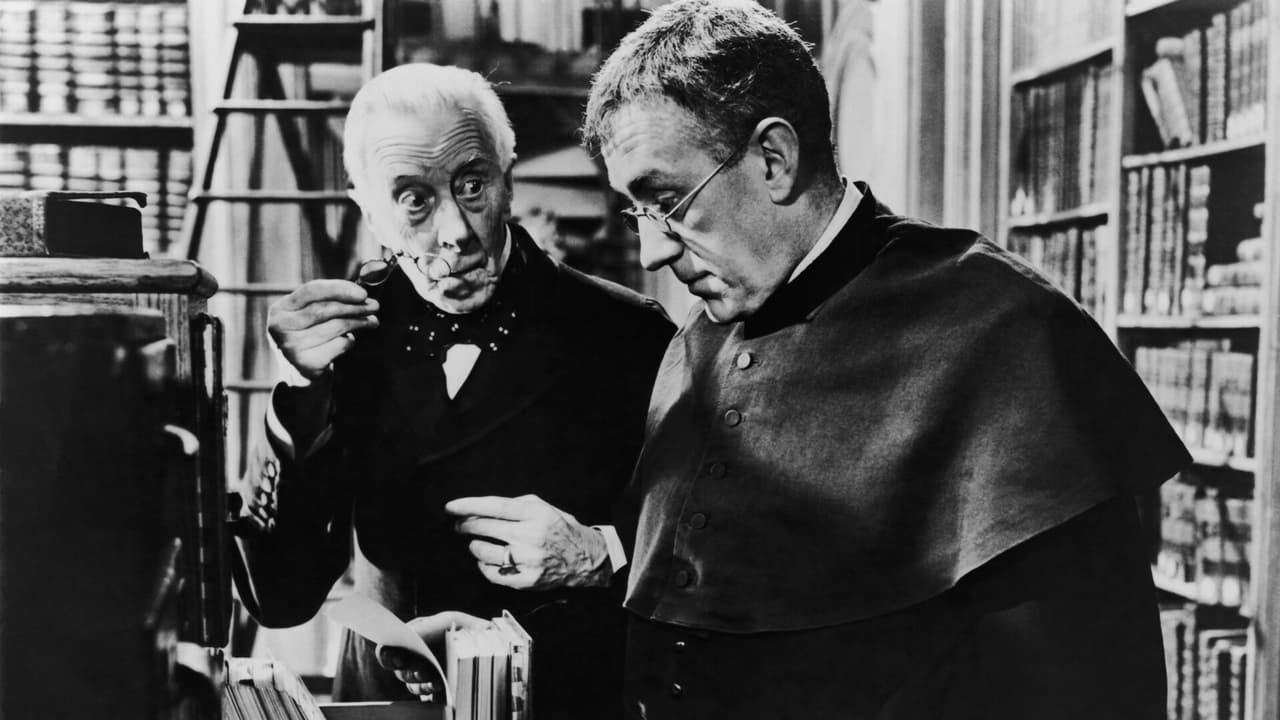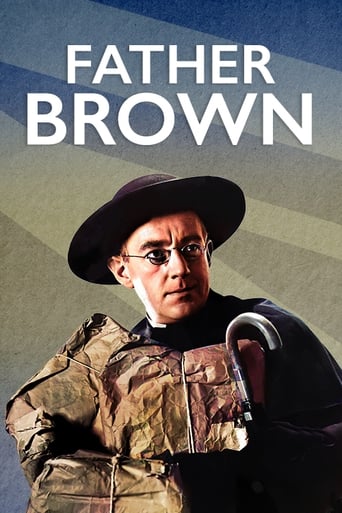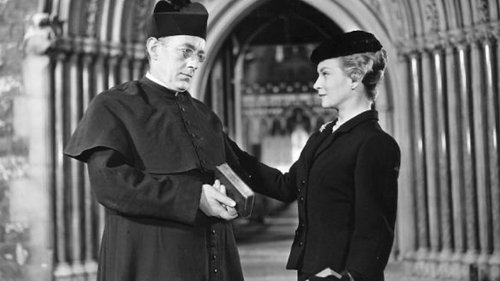Harockerce
What a beautiful movie!
AniInterview
Sorry, this movie sucks
Tacticalin
An absolute waste of money
Lollivan
It's the kind of movie you'll want to see a second time with someone who hasn't seen it yet, to remember what it was like to watch it for the first time.
JohnHowardReid
Music conducted by Muir Mathieson. RCA Sound Recording. Associate producer: Vivian Cox. Producer: Paul Finder Moss. Copyright 1 September 1954 by Facet Productions Ltd, London. Released through Columbia Pictures. New York opening at the Fine Arts: 1 November 1954. U.S. release: March 1955. London trade show: June 1954. Australian release: 9 June 1956 (sic). Sydney opening at the Lyceum. 8,200 feet. 91 minutes. Cut to 86 minutes in the U.S.A. (Until recently, this superb movie was only available on VHS, but Sony have now released a full 95 minutes version on DVD).U.S. release title: the DETECTIVE. U.K. release title: FATHER BROWN.SYNOPSIS: A master thief has his eyes on the priceless Cross of St Augustine carried by Father Brown on his way to Rome.COMMENT: A delight. True, the screenplay isn't quite as colorfully witty or chock-full of weird surprises as the original Chesterton pieces, (and the long arm of co-incidence in the story line strains — but by no means shatters — credulity in one or two places), but the writers make some pretty ingenious stabs in the right directions. Moreover, the direction is so deft and pacey, there's no time to ponder any trivial inconsistencies of plot or characterization. Plus the movie has been produced on a class "A" budget, with lots of extras milling around in plenty of fascinating sets and real-life locations.Aside from the polished screenplay, astute direction, sprightly music score and appealing visuals, the movie excels in its acting department. Alec Guinness makes a fine Father Brown, every inch as likable — and accurate — as Chesterton's creation, whilst Finch enjoys one of the best roles of his career as the masterful yet quirky misanthropic thief, Flambeau. Supporting honors lie in the hat-tossing hands of such stalwart character players as Bernard Lee, Sid James, Ernest Thesiger, Cecil Parker, John Salew, and Gerard Oury.Oddly, despite its credentials as one of the best British comedies of the year, plus box-office super-favorites Guinness and Finch in the leads, the movie was not successful in Australia. Perhaps the lack of a traditionally boring love interest swayed audiences to give the picture a miss. True, Joan Greenwood is co-starred, but her role is small and colorless.OTHER VIEWS: While the movie has not a great deal in common with Chesterton, does it really matter? On its own terms, the movie is mightily engaging. Not just for its performances, although these are no mean attractions. Guinness makes Brown so deliciously sly, full of almost mischievous humour, whilst Finch's equally appealing portrait of the suave, melancholy Flambeau, Joan Greenwood's charmingly mannered aristocratic parishioner, Sid James' fluent reformed thief, Cecil Parker's lordly bishop and Ernest Thesiger's fumbling master of heraldry, add greatly to the overall merriment. What makes Father Brown such an unalloyed delight is not just the story and the stars — appealingly attractive though they be — but Robert Hamer's stylish direction which — as Penelope Houston points out in her Monthly Film Bulletin review — has such a wonderfully detached, highly civilized air, "the more welcome because, in the British cinema, it is so uncommon."But what more could you expect of the director of Pink String and Sealing Wax, It Always Rains on Sunday, Kind Hearts and Coronets, and The Long Memory? JHR writing as George Addison.
Cristi_Ciopron
Flambeau reminded me of Lupin, and this movie is like a witty, graceful adaptation of a Lupin tale; the French inspiration is acknowledged. For me, it's one of the masterpieces of the free adaptations, on a pair with a few French works.What it has is a delightful style, a consummate craft. This graceful movie has the plot of a Fantômas or Lupin yarn. Perhaps it might appeal to those who search for stylish renderings of such stories. It also suggests how would world look like from the standpoint of a priest, who evaluates without severity or identification, with a critical sympathy; the human world, and also the world of objects, caressed by Guinness' hands. The perspective on the human affairs is blessedly naive, appealing and endearingly fanciful. It originates in a highly intelligent recluse's reverie. Beyond it, one feels the political and social utopia of the revered storyteller and thinker. And I guess he would of enjoyed this movie.Flambeau is awesomely played by a handsome Peter Finch. And as a priest, he looked a bit like De Niro.As played by Guinness, Fr Brown resembles more the storyteller, the author, than the authored priest. Anyway, the priest being unexpectedly attacked by his sparing partner might of been an inspiration on the Pink Panther gag, with Cato's surprise attacks on his master.A movie with Guinness, Peter Finch, Oury, it opposes a priest and a freelancer of the underworld, Flambeau, who, disguised as a priest, quotes the Bible but forgets to fast.What is called playful means sometimes graceful; others, silly. Here, it is the 1st meaning.
MartinHafer
This was a completely mediocre film--and that's a real shame, as I usually LOVE Alec Guinness movies. This movie lacks so much of the imagination and energy of his other movies from this same era (such as THE LADY KILLERS or THE MAN IN THE WHITE SUIT) and overall is just a standard amateur detective flick in the guise of a rather unbelievable priest. Guinness plays Father Brown--a very idealistic, and at times bumbling, clergy man. Peter Finch plays an international thief who loves to steal one-of-a-kind relics--the type that really can't be re-sold--so he's obviously some kind of nutter (that's British for "loony"). Despite ample opportunities to turn in Finch to the coppers, Guinness actually hinders the police and lies repeatedly (oh well, since he's a priest I guess he can always give himself absolution for these sins). Why? Well, because Guinness knows that it's more important to save the man's soul than find the booty. While this is true in a spiritual sense, it was awfully idealistic (not to mention stupid), but since this is a rather predictable film, in the end Finch somehow sees the light (though I really wasn't sure why). The film earns a 5 simply because I like watching Alec Guinness and Finch does a pretty good job, though the material is awfully lame.
OddJob-6
A great movie that contains another great Guinness character. Instead of trying to break the law in the "Lavender Hill Mob", he does right by helping his "subjects". He latches on to the most wanted thief in Britian and instead of turning him in does his own work to find and search him out. In the end the thief donates his warez to a museum and Father Brown changes the life of a criminal. Very entertaining.


